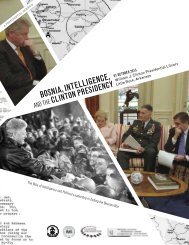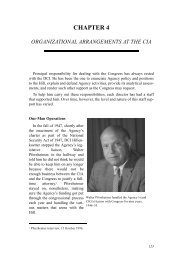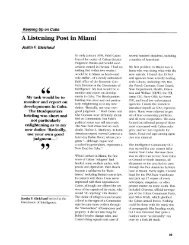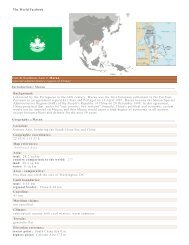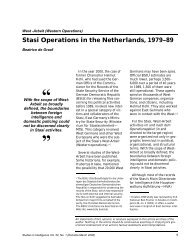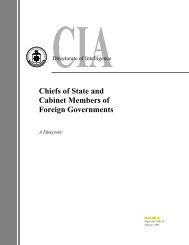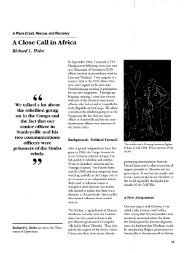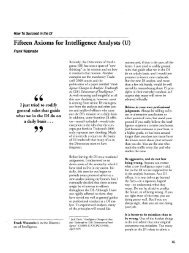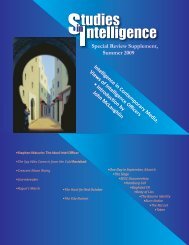Analytic Culture in the U.S. Intelligence Community (PDF) - CIA
Analytic Culture in the U.S. Intelligence Community (PDF) - CIA
Analytic Culture in the U.S. Intelligence Community (PDF) - CIA
Create successful ePaper yourself
Turn your PDF publications into a flip-book with our unique Google optimized e-Paper software.
A TAXONOMY OF INTELLIGENCE<br />
Comparatively little work has been done<br />
compar<strong>in</strong>g structured techniques to <strong>in</strong>tuition.<br />
Robert Folker’s work is one of <strong>the</strong> exceptions; it<br />
compares <strong>the</strong> effectiveness of a modified form of<br />
alternative compet<strong>in</strong>g hypo<strong>the</strong>ses with <strong>in</strong>tuition<br />
<strong>in</strong> a controlled experimental design. His study is<br />
unique <strong>in</strong> <strong>the</strong> field and demonstrates that<br />
experimental methods are possible. Gerald<strong>in</strong>e<br />
Krotow’s research, on <strong>the</strong> o<strong>the</strong>r hand, looks at<br />
differ<strong>in</strong>g forms of cognitive feedback dur<strong>in</strong>g <strong>the</strong><br />
analytic process and makes recommendations to<br />
improve <strong>in</strong>telligence decisionmak<strong>in</strong>g. 32<br />
Idiosyncratic Variables<br />
Variables <strong>in</strong> <strong>the</strong> third column are those that<br />
<strong>in</strong>fluence <strong>in</strong>dividuals and <strong>the</strong>ir analytic performance.<br />
These <strong>in</strong>clude <strong>the</strong> sum of life experiences<br />
and enculturation—familial, cultural, ethnic, religious,<br />
l<strong>in</strong>guistic, and political affiliations—that<br />
identify an <strong>in</strong>dividual as a member of a group. I<br />
have used <strong>the</strong> German word Weltanschauung<br />
(customarily rendered <strong>in</strong> English as “world view”)<br />
to denote this concept. These idiosyncratic variables<br />
also encompass such psychological factors<br />
as biases, personality profiles, cognitive styles and<br />
process<strong>in</strong>g, cognitive loads, 33 expertise, approach<br />
to problem-solv<strong>in</strong>g, decisionmak<strong>in</strong>g style, and<br />
reaction to stress. F<strong>in</strong>ally, <strong>the</strong>re are such doma<strong>in</strong><br />
variables as education, tra<strong>in</strong><strong>in</strong>g, and <strong>the</strong> read<strong>in</strong>ess<br />
to apply knowledge, skills, and abilities to <strong>the</strong> task<br />
at hand.<br />
Idiosyncratic Variables<br />
Weltanschauung (worldview)<br />
Affiliation<br />
Familial<br />
Cultural<br />
Ethnic<br />
Religious<br />
Social<br />
L<strong>in</strong>guistic<br />
Political<br />
Psychology<br />
Bias<br />
Personality Profile<br />
Security Trust<br />
Cognitive Process<strong>in</strong>g<br />
Learn<strong>in</strong>g Style<br />
Information Acquisition<br />
Information Process<strong>in</strong>g<br />
Expertise<br />
Problem-solv<strong>in</strong>g<br />
Decisionmak<strong>in</strong>g<br />
Cognitive Load<br />
Speed/Accuracy<br />
Stress Effects<br />
Education<br />
Doma<strong>in</strong><br />
Location<br />
Mentor<br />
Tra<strong>in</strong><strong>in</strong>g<br />
Organizational<br />
Doma<strong>in</strong><br />
Procedural<br />
Read<strong>in</strong>ess<br />
Resources<br />
Facilities<br />
The relevant psychological literature is extensive. Amos Tversky and Daniel<br />
Kahneman began to exam<strong>in</strong>e psychological biases <strong>in</strong> <strong>the</strong> early 1970s. 34 Their<br />
work has found its way <strong>in</strong>to <strong>the</strong> <strong>in</strong>telligence literature through Butterfield,<br />
32<br />
Gerald<strong>in</strong>e Krotow, The Impact of Cognitive Feedback on <strong>the</strong> Performance of <strong>Intelligence</strong> Analysts,<br />
176.<br />
33<br />
“Cognitive loads” are <strong>the</strong> amount/number of cognitive tasks weighed aga<strong>in</strong>st available cognitive<br />
process<strong>in</strong>g power.<br />
34<br />
Amos Tversky and Daniel Kahneman, “The Belief <strong>in</strong> <strong>the</strong> ‘Law of Small Numbers’” and “Judgment<br />
Under Uncerta<strong>in</strong>ty: Heuristics and Biases.”<br />
41




